If Inflation Is a Monetary Phenomenon, Is U.S. Hyperinflation a Clear and Present Danger?
Economics / Inflation Aug 20, 2009 - 01:01 AM GMTBy: Paul_L_Kasriel
 We hear a lot of concern that the Fed's mushroomed balance sheet over the past two years is setting the stage for a 1970s' style inflation here. So long as we have a fiat (a.k.a. Chrysler?) monetary standard, the threat of hyperinflation always lurks. But is the stage currently being set for such an eventuality? I do not think so.
We hear a lot of concern that the Fed's mushroomed balance sheet over the past two years is setting the stage for a 1970s' style inflation here. So long as we have a fiat (a.k.a. Chrysler?) monetary standard, the threat of hyperinflation always lurks. But is the stage currently being set for such an eventuality? I do not think so.
Chart 1 shows the behavior of changes in the M2 money supply over the past 50 years on a year-over-year basis. After the Lehman crisis in the summer of 2008, M2 growth accelerated sharply. By January 2009, the year-over-year growth in M2 reached 10.1%. Although not quite matching the 13-1/2% M2 growth often reached in the 1970s, if sustained, 10% M2 growth certainly would have the potential to push inflation significantly higher. Although the year-over-year growth in M2 has decelerated to 8.4% in July, that rate of growth if sustained, could still pack plenty of inflationary punch. So, why am I still not worked up about the potential for a 1970s' style of inflation?
Chart 1
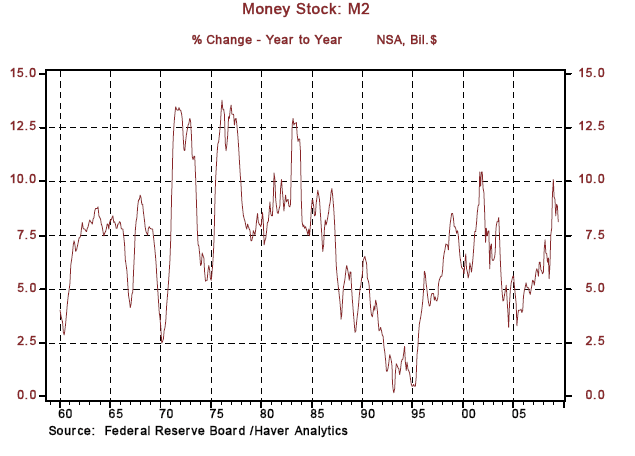
Take a look at Chart 2, which plots the behavior of the M2 money supply on a six-month annualized basis. After the spike to 15.2% annualized growth in February of this year, in the six months ended July, annualized M2 growth was only 2.7%. Barring another surge in M2 growth, this sharp six-month deceleration in M2 growth implies a continued deceleration in year-over-year M2 growth and, thus, a reduced likelihood of a repeat of the 1970s high-inflation environment.
Chart 2
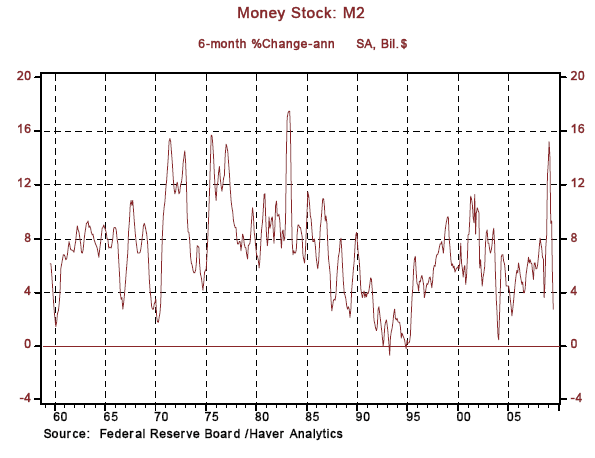
How is it that the explosion in assets on the Fed's balance sheet from approximately $901 billion at the end of July 2007 to approximately $2 trillion at the end of July 2009 (see Chart 3) has not resulted in a sustained explosion in M2 money supply growth? Because of the extraordinary increase in excess, or idle, cash reserves on the books of banks. As shown in Chart 4, banks' excess reserves soared from only $1.6 billion in July 2007 to almost $733 billion in July 2009. So, about 64% of the increase in Fed assets in the two years ended July 2009 was accounted for by the increase in idle cash reserves sitting on the books of banks. A further 8.5% of the two-year increase in Fed assets was accounted for by an increase in currency in our pockets and/or squirreled away in our safe deposit boxes (see Chart 5). This dramatic increase in the demand for "folding money" was likely the result of an extreme case of risk aversion rather than a preparation for a shopping splurge (other than for canned goods and ammo, perhaps).
Chart 3
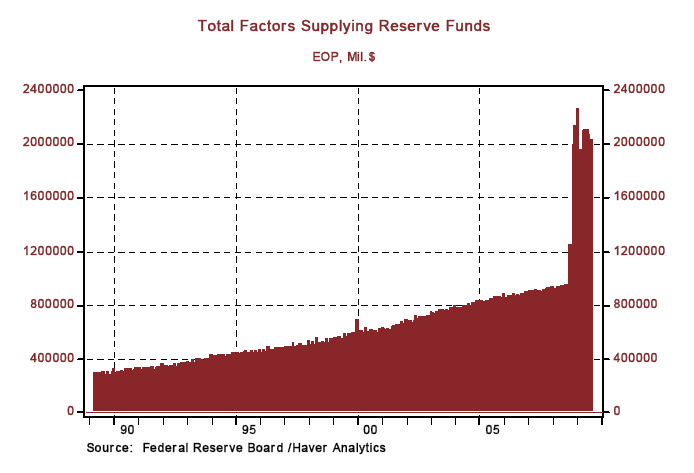
Chart 4
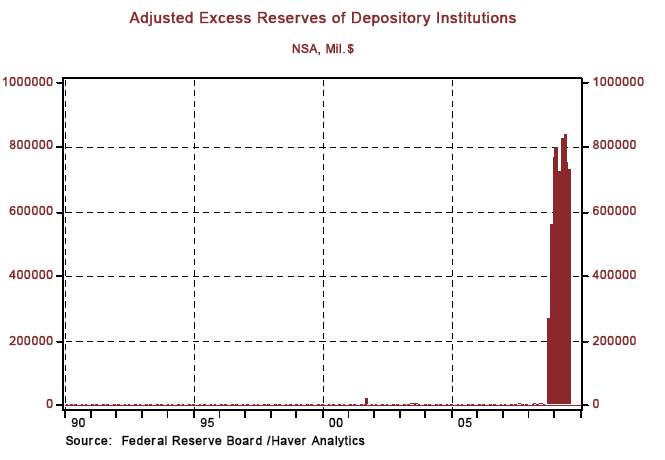
Chart 5
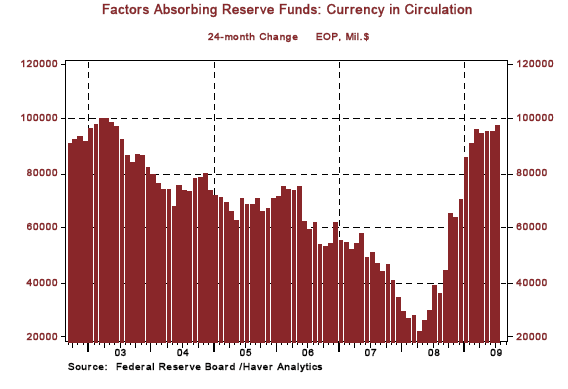
Why have banks allowed idle cash reserves to pile up on their balance sheets? Several reasons. For starters, the Fed now pays them a nominal rate of interest to hold these idle reserves. But this is not the main cause of soaring excess reserves. The principal reasons are lack of capital and lack of demand from borrowers who might be able to stay current on loans. The banking system has experienced sharp losses in the past year and is about to experience a second wave of losses. These losses deplete bank capital. Without adequate capital, the banking system cannot create new credit. At the same time that banks are strapped for capital, they also are strapped for loan customers who are judged creditworthy (see Chart 6).
Chart 6
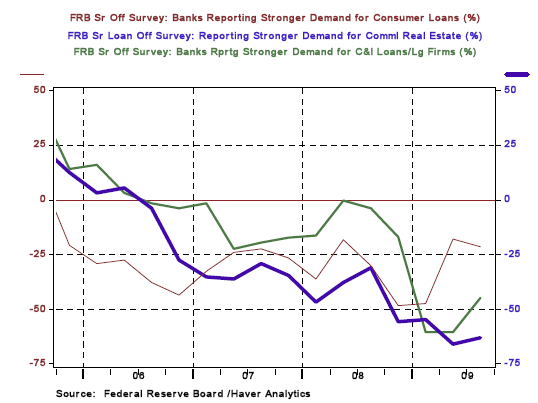
But, a year from now, the banking system is likely to be better capitalized and the demand for bank credit from creditworthy borrowers is likely to be rising. This is when we will have to start to be more concerned about that mountain of excess reserves sitting on the books of banks being "activated" to create new credit to the nonbank sector. If the Fed does not take steps to adequately neutralize these excess reserves, then the inflationary game will be on. I do not currently know how adroit the Fed will be in neutralizing excess reserves. Evidently those who are forecasting a return to 1970s style inflation do know. More power to them.
Paul Kasriel is the recipient of the 2006 Lawrence R. Klein Award for Blue Chip Forecasting Accuracy
By Paul L. Kasriel
The Northern Trust Company
Economic Research Department - Daily Global Commentary
Copyright © 2009 Paul Kasriel
Paul joined the economic research unit of The Northern Trust Company in 1986 as Vice President and Economist, being named Senior Vice President and Director of Economic Research in 2000. His economic and interest rate forecasts are used both internally and by clients. The accuracy of the Economic Research Department's forecasts has consistently been highly-ranked in the Blue Chip survey of about 50 forecasters over the years. To that point, Paul received the prestigious 2006 Lawrence R. Klein Award for having the most accurate economic forecast among the Blue Chip survey participants for the years 2002 through 2005.
The opinions expressed herein are those of the author and do not necessarily represent the views of The Northern Trust Company. The Northern Trust Company does not warrant the accuracy or completeness of information contained herein, such information is subject to change and is not intended to influence your investment decisions.
Paul L. Kasriel Archive |
© 2005-2022 http://www.MarketOracle.co.uk - The Market Oracle is a FREE Daily Financial Markets Analysis & Forecasting online publication.



